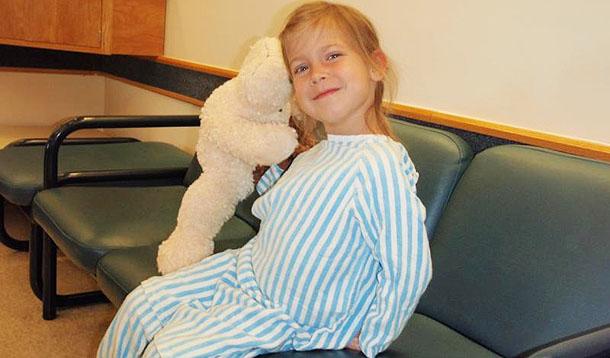
When my youngest daughter was four, we noticed she had started to snore. At first, we thought it was cute, but then it started to sound like a freight train roaring through the house at night. Our family doctor immediately sent her for a sleep study. Imagine our surprise when our little waif of a girl was diagnosed with sleep apnea!

Sleep apnea is a chronic condition that disrupts a person’s sleep cycle. It causes the affected person to stop breathing several times an hour which deprives them of valuable oxygen. The snoring happens when they catch their breath. In my daughter’s case, it meant her brain wasn’t getting the oxygen it needed to grow and it meant she was constantly tired. The doctors determined that the best course of action was to schedule her for a tonsillectomy.
Growing up, it seemed to me that just about every kid I knew had a tonsillectomy. I carried the memory of kids getting a week off school and eating ice cream into my adulthood. So, when it was decided that Ava would have to get her tonsils out, I figured it would be a pretty routine surgery and she would bounce back fast. My kid had other plans.
When Ava woke up from surgery, her pain was under control, but not for long. Once the pain caught up with her, our trouble started. Thanks to a strong stubborn streak inherited from her father’s side of the family, the kid dug in. Her throat hurt so much that she refused to eat, drink, or take her medication. Without her medication, the pain got worse which made her more afraid to eat or drink anything. Her “routine” surgery suddenly became anything but routine.
When all was said and done, Ava’s hospital stay was extended an extra three days due to pain issues. As a mother, it was heartbreaking to watch and I wish I had been better prepared beforehand to deal with her post-operative pain. I wish I had access to information from the It Doesn’t Have to Hurt initiative six years ago.
Thousands of children undergo surgery every year and in the last 20 years, there has been a major shift towards same-day surgeries. This means that children return home sooner and it is up parents to assess pain. I can tell you first hand that good pain management post-surgery is key. Here's what you need to know to manage and assess post-operative pain in your child:
Studies have shown that when parents are trained in pain assessment and management, their children have less pain. Use this pain measurement checklist from the Centre for Pediatric Pain Research to get started.
Discuss the different types of medication your child will need with your surgeon or anesthesiologist in advance so you are prepared.
Research has shown that parents typically give their children less than the prescribed doses of pain medication or less powerful pain medications than recommended. Many parents only give pain medication post-surgery on an as-needed basis, but unfortunately, this is the wrong approach. It’s best to give pain medications “around the clock” (which means at regular times, day and night) to keep the pain away. As seen with my daughter, once the pain gets out of control, it can be harder to catch up. As parents, we worry about giving our child too much. We worry about addiction and tolerance but when it comes to pain management, follow your doctor’s recommendations to the letter.
Parents tend to neglect pain management techniques that don’t use medicine. Practice deep breathing, relaxation and visualization techniques with your child to keep pain under control in conjunction with medicine.
Be sure you and/or the health professionals taking care of your family discuss the answers to the following questions with your kid before surgery:
Note that almost all of points above are about pain but it's important that kids get honest answers to these questions. For more information about preparing your child for surgery, visit your hospital website. Sick Kids Hospital in Toronto has a great resource on their website.
The most important thing you can do as a parent to prepare your child for surgery is to arm yourself with knowledge, because It Doesn’t Have to Hurt.


This is proudly sponsored by our friends at the Centre for Pediatric Pain Research.
www.itdoesnthavetohurt.ca